The Skinny Truth About Fats

The Skinny Truth About Fats
Feb 17, 2022 | By JOI team
With all the “low-fat” and “fat-free” products on the market, it’s not a surprise that most people have a negative association with fats! Whether it’s about gaining weight, raising cholesterol levels, increasing risk for heart disease... talk about a bad reputation. All of which is true, but only to a certain extent.
The fat we eat, known as dietary fat, is one of three essential macronutrients in a diet. Carbohydrates, proteins and fats are the three musketeers of nutrition. They must stay together through all your meals! Not one can be excluded from the dinner party... (we're looking at you, keto diet).
Fat Is Essential In Your Diet
Dietary fats, just as carbohydrates and proteins, are indispensable in your diet. That's because they perform crucial—and unique—functions in the body. For starters, fat is essential for the transport and absorption of fat-soluble vitamins (A, D, E, K) in the body.
It also plays a role in regulating body temperature, hormones, immune function, and reproduction.
Fat also serves as fuel for our bodies, energy storage and energy supply.
It’s also an integral structural component of cell membranes — you know, those tiny little things that make up our entire bodies and which keep us alive.
Finally, dietary fats increase satiety as they provide more calories per gram than any other macronutrient (9 calories per gram in fats versus 4 calories per gram in carbohydrates and proteins).
However, not all fats are created equal, and their chemical structure is what determines how they affect our health.
Eating Fat Does Not Make You Fat
It’s not ideal that the concept of gaining weight is so often associated with fats found in foods. Speaking from a caloric perspective, this would make sense since fats contain more calories per gram compared to protein and carbohydrates.
But if you read this article, you may know that a calorie in itself is not a determinant of health. And, that the types of food you eat affect your metabolism, your gut flora, and your weight in different ways.
Plus, dietary fat does not automatically convert to body fat. It will, however, convert to fat if consumed in excess...but the same goes for carbohydrates and proteins (sorry to break it to you).

In fact, research comparing different types of diets found that those higher in healthy fats (nuts, seeds, avocado, fatty fish) experienced more weight loss than those adopting a low-fat diet.
It’s important to note that people eating low-fat diets often compensate their calories by consuming more refined carbohydrates and added sugars, both of which promote fat storage and weight gain. One study looked at the long-term effects of a Mediterranean diet with unrestricted calories and high in healthy fats. The study found that individuals gained less body fat in the abdominal area when compared to a control diet. Participants on the Mediterranean diet also lost more weight than those on a low-fat diet, which is comparable to another study that found no evidence supporting that a low-fat diet contributes to weight loss.
Eat This Kind Of Fat
Before we get ahead of ourselves, it’s important to know that foods containing fats usually contain two types (the good ones and the not-so-good ones), but in different proportions.
So, you’ll want to consume the fats that contain more of the good kind, unsaturated fats, and less of the other kind, saturated fats. The famous “healthy fats” we so often hear about refer to unsaturated fats. These are usually liquid at room temperature (such as olive oil). Unsaturated fats are known to help reduce total cholesterol levels, including LDL (“bad”) cholesterol and triglyceride levels. These in turn reduce the risk for cardiovascular diseases. Several studies have found unsaturated fats reduce the risk for heart disease, especially when they replace saturated fats.
There are two types of unsaturated fats - monounsaturated and polyunsaturated fatty acids (fatty acids are the building blocks of fats).
The difference between “mono” and “poly” has to do with the chemical structure of the fatty acids, and the number of double bonds they contain (“mono” as in one, “poly” as in many). But not to worry, we won’t get into a chemistry lecture today.
Here’s what you need to know: Unsaturated fatty acids are the healthy fats you want to consume. Why? Because they are known to reduce inflammation, improve cholesterol levels, and reduce your risk for heart disease. Here are the best sources of these fats:
Monounsaturated Fats
- Olive oil
- Almonds (or JOI Almond base!)
- Cashews (or JOI Cashew base!)
- Peanuts
- Pistachios
- Olives
- Pumpkin seeds
- Avocado
- Sunflower seeds
- Dark chocolate (70% or higher)*
*Note: Dark chocolate contains both unsaturated and saturated fats. However, research shows that the fat in cocoa butter does not have the same cholesterol-raising effects as other saturated fats, and one study found cocoa powder to reduce LDL (“bad”) cholesterol, and increase HDL (“good”) cholesterol. This is due to the different types of saturated fats found in cocoa butter and the high levels of antioxidants in cacao which improve blood flow and blood pressure, reducing the risk for cardiovascular disease.
Polyunsaturated Fats
These include omega-3 and omega-6 fatty acids. You’ll want to focus on omega-3 sources as these support brain health, reduce inflammation and lower blood pressure. Here are the best sources of omega-3 fatty acids:
- Fatty fish (salmon, herring, sardines, mackerel, anchovies)
- Flax seeds
- Chia seeds
- Walnuts
- Soybeans
- Plant oils: Safflower, grapeseed, flaxseed and sunflower oil
Limit This Kind Of Fat
Fats’ bad rep comes from saturated fats. Saturated fats are found in high amounts in most of America’s favorite foods such as hamburgers, french fries, ice cream and cookies.
These delicious, convenient and addicting foods are the ones known to increase your risk for cardiovascular conditions such as heart disease and stroke. Consistent evidence shows that saturated fats increase LDL (cholesterol in the blood), the kind that puts you at risk for disease.
They are also the ones responsible for America’s high obesity rates and type 2 diabetes cases (along with another favorite: added sugars). Fats high in saturated fatty acids are usually solid at room temperature (thinking of you, butter).
The majority of saturated fat sources come from animal products such as meats and dairy… another reason why we love plant-based diets! Saturated fats should be limited to less than 10% of your daily calories. Here are the main sources:
- Red meat: beef, lamb, pork
- Poultry: chicken, turkey
- Dairy products: whole milk, butter, shortening, heavy cream, cheese
- Coconut oil
- Palm oil
Avoid At All Costs
You may have heard of trans fats, an artificial kind of fat that is made from hydrogenated oils to convert liquid fats into solid fats at room temperature. Until 2018, this kind of fat was commonly added to processed foods. Trans fats were found to significantly raise LDL (“bad”) cholesterol levels, lower HDL (“good”) cholesterol, and therefore increase the risk of death from heart attacks.
Luckily, the U.S. Food and Drug Administration (FDA) decided that these hydrogenated oils were not safe and ordered food manufacturers to eliminate trans fats from their products. But what they didn’t tell you is that products containing less than 0.5 grams of trans fat per serving may be labelled as having “zero trans fat”! So please ditch anything containing “partially hydrogenated oils” on the ingredient list and beware of fast foods.
By the way, trans fats occur naturally in food products made from ruminant animals (yikes).
So, Should I Be Eating More Fats?
You may have heard of the ketogenic (“keto”) diet, a very high-fat and low-carbohydrate diet that has gained popularity in the last couple of years.
Although there are some variations, most of the keto diets require 70-80% of calories to come from fat, 20% from protein and 5-10% from carbohydrates. This diet starves the body from carbohydrates (your body’s preferred source of energy) which requires the use of fats for energy in the form of ketone bodies.
The short-term effects of this diet include weight loss, improved blood sugar levels, and even improved lipid profile (cholesterol levels). However, these positive effects seem to be short-lived.
Although more studies are needed to evaluate the long-term effects of keto, the studies available indicate that a ketogenic diet may promote non-alcoholic fatty liver disease, insulin resistance (inability to process sugars), vitamin deficiency, and increased risk for heart disease in the long-term.
Plus, practically eliminating an entire macronutrient group is, to say the least, not sustainable, impractical and unrealistic. Also, not recommended. Hence why we say, everything in moderation.
A Recipe For Success With Fats
While dietary fats have crucial functions in our bodies and are essential in a healthy diet, moderation is key (I’m sorry we can’t live off avocados and almond butter).
A well-balanced diet includes all macronutrients, with 45-65% calories coming from carbohydrates, 10-35% from proteins and 20-35% from healthy fats. The inclusion of all essential nutrients in the right amounts serve to meet our body’s daily demands and ensure we have a well-functioning system. A diet rich in whole grains, legumes, fruits, vegetables, lean proteins and healthy fats such as nuts and seeds, is the perfect recipe for a sustainable and health-promoting diet. Bring on the healthy fats with a cup of JOI!
About Carolina Schneider MS, RD (@thegreenrd):
Originally from Brazil, Carolina moved to Florida to complete her Master of Science in Nutrition & Dietetics. She recently relocated to New York City to pursue her career as a registered dietitian in the health food industry. She is a Nutrition Consultant for JOI and one of our biggest fans! Carolina believes in the power of a whole-food, plant-based diet combined with physical activity for optimal health. Her favorite foods are dark chocolate and broccoli (preferably not together), and her favorite JOI recipe is the Golden Milk!





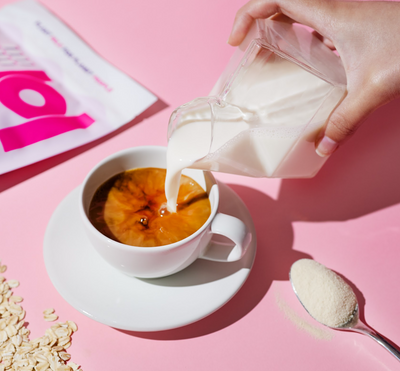
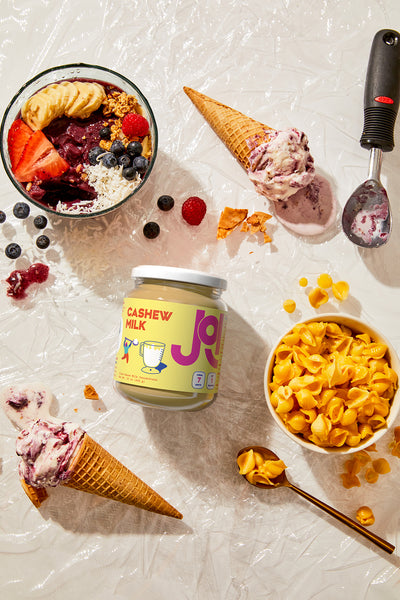
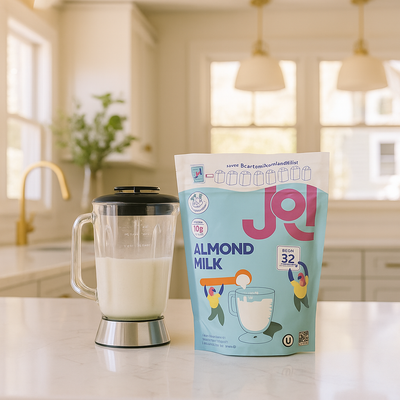
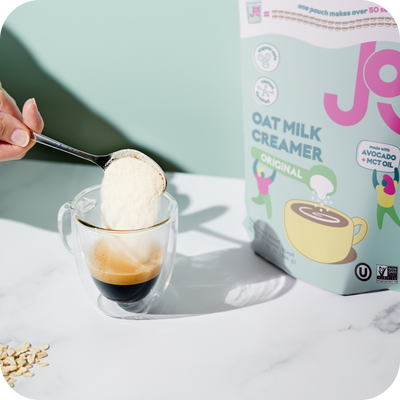
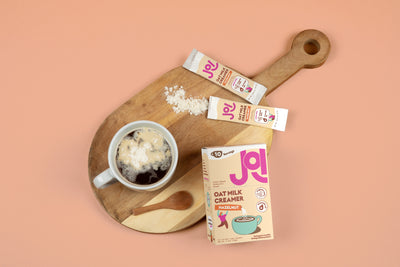
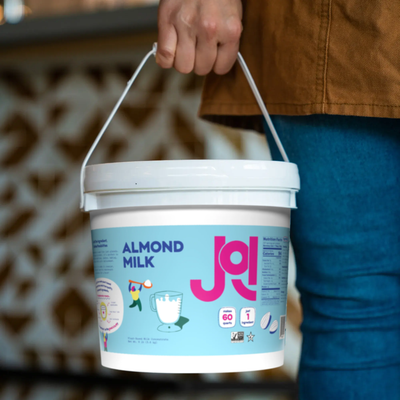
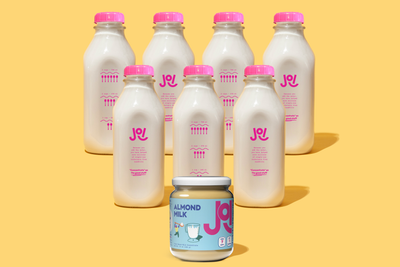
 CHECKOUT
CHECKOUT